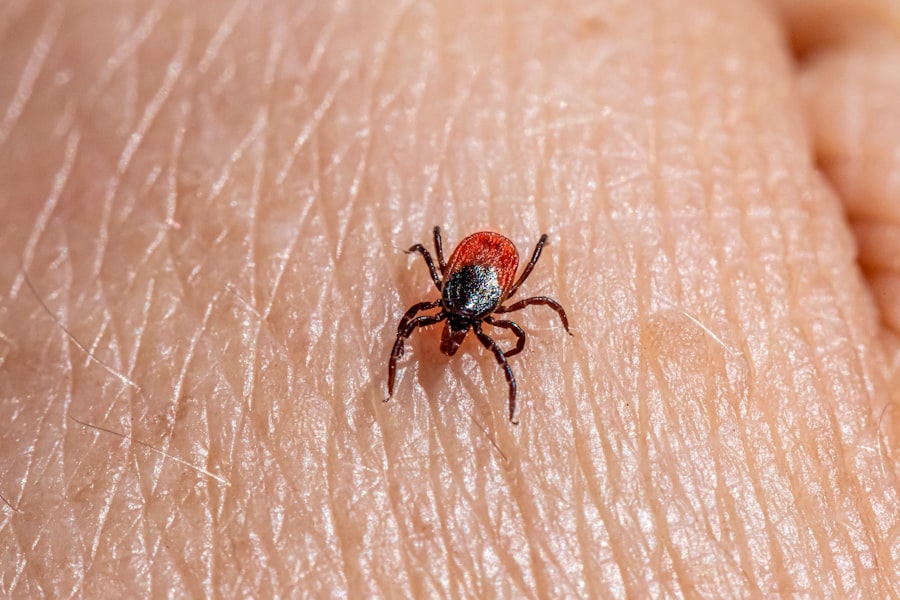Ticks pose a significant threat to the health and well-being of chickens. These blood-sucking parasites can transmit a variety of diseases, including Lyme disease, anaplasmosis, and ehrlichiosis. When ticks infest a chicken, they can cause irritation, discomfort, and stress, leading to decreased egg production and overall decline in the bird’s health.
Additionally, severe infestations can lead to anemia and even death in extreme cases. Ticks are most commonly found in grassy and wooded areas, making free-range chickens particularly susceptible to infestation. It is crucial for chicken owners to understand the potential dangers of ticks and take proactive measures to protect their flock from these harmful parasites.
Ticks are not only a threat to the physical health of chickens but also to the economic well-being of poultry farmers. Infestations can lead to decreased productivity and increased veterinary costs, ultimately impacting the profitability of the chicken operation. Therefore, it is essential for chicken owners to be vigilant in preventing and controlling tick infestations to ensure the health and productivity of their flock.
By understanding the threat that ticks pose to chickens, owners can take the necessary steps to create a safe and healthy environment for their birds.
Table of Contents
- 1 Creating a tick-free environment for chickens
- 2 Implementing natural repellents for ticks on chickens
- 3 Regularly inspecting chickens for ticks
- 4 Using chemical treatments for tick prevention on chickens
- 5 Maintaining a clean coop and surrounding area to reduce tick presence
- 6 Seeking veterinary advice for tick prevention and treatment for chickens
- 7 FAQs
Key Takeaways
- Ticks pose a significant threat to chickens, as they can transmit diseases and cause discomfort.
- Creating a tick-free environment for chickens involves keeping the coop and surrounding area clean and well-maintained.
- Natural repellents such as diatomaceous earth and essential oils can help deter ticks from infesting chickens.
- Regularly inspecting chickens for ticks is crucial for early detection and prevention of infestations.
- Chemical treatments, such as spot-on treatments and sprays, can be used for effective tick prevention on chickens.
- Maintaining a clean coop and surrounding area is essential for reducing the presence of ticks and preventing infestations.
- Seeking veterinary advice is important for developing a comprehensive tick prevention and treatment plan for chickens.
Creating a tick-free environment for chickens
Maintaining a Clean and Well-Maintained Coop
Maintaining a clean and well-maintained coop and surrounding area is crucial in preventing tick infestations and protecting the health of the flock. Regularly mowing grass, removing leaf litter, and keeping the area around the coop free of debris can help reduce the presence of ticks.
Creating a Barrier and Providing a Dust Bathing Area
Creating a barrier between wooded areas and the chicken coop, such as a gravel or mulch border, can help prevent ticks from migrating into the chicken’s living space. Additionally, providing chickens with a dust bathing area can help them control parasites such as ticks. By providing a designated area filled with fine dust or sand, chickens can effectively rid themselves of ticks and other parasites.
Implementing Proper Fencing and Netting
Implementing proper fencing and netting around the coop can help prevent wild animals, such as deer and rodents, from bringing ticks into the chicken’s environment. By creating a tick-free environment for chickens, owners can significantly reduce the risk of infestation and protect the overall health of their flock.
Implementing natural repellents for ticks on chickens

Implementing natural repellents for ticks on chickens can be an effective way to prevent infestations without relying on chemical treatments. One natural repellent that has been found to be effective is diatomaceous earth. This powdery substance is made from fossilized algae and works by dehydrating and killing ticks upon contact.
By dusting diatomaceous earth in the chicken coop and nesting boxes, owners can help control tick populations and protect their flock from infestation. Another natural repellent for ticks is essential oils. Oils such as lavender, eucalyptus, and peppermint have been found to have tick-repelling properties.
By diluting these oils with water and spraying them on the chicken’s feathers, owners can create a natural barrier against ticks. Additionally, planting tick-repelling herbs such as rosemary, thyme, and oregano around the coop can help deter ticks from entering the chicken’s living space. By implementing natural repellents for ticks on chickens, owners can reduce the reliance on chemical treatments while effectively protecting their flock from infestation.
Regularly inspecting chickens for ticks
Regularly inspecting chickens for ticks is crucial in identifying infestations early and preventing potential health issues. Owners should make it a routine to thoroughly examine their flock for any signs of tick infestation, paying close attention to areas such as under the wings, around the vent, and on the legs and feet. Ticks can be easily missed due to their small size and ability to hide in feathers, so a careful and thorough inspection is necessary.
In addition to visual inspections, owners should also be aware of any behavioral changes in their chickens that may indicate a tick infestation. Signs such as excessive scratching, restlessness, or decreased egg production can be indicative of a tick problem. If any ticks are found during inspections, they should be promptly removed using tweezers or a tick removal tool.
Regularly inspecting chickens for ticks allows owners to quickly address infestations and prevent potential health issues within the flock.
Using chemical treatments for tick prevention on chickens
In some cases, using chemical treatments for tick prevention on chickens may be necessary to effectively control infestations. There are various commercial products available that are specifically formulated for use on poultry to control ticks and other parasites. These products may come in the form of sprays, dusts, or spot-on treatments that are applied directly to the chicken’s feathers or skin.
It is important for owners to carefully follow the instructions provided by the product manufacturer when using chemical treatments on chickens to ensure safety and effectiveness. Additionally, it is crucial to consider withdrawal periods for any products used on laying hens to avoid contamination of eggs. While chemical treatments should be used as a last resort and with caution, they can be an effective tool in controlling tick infestations and protecting the health of the flock.
Maintaining a clean coop and surrounding area to reduce tick presence

Coop Cleaning and Maintenance
Regular cleaning of the coop is essential in eliminating potential hiding spots for ticks. This includes removing soiled bedding, droppings, and debris, which can help reduce the habitat for ticks and other parasites.
Yard Maintenance
Keeping the surrounding area clean and well-maintained is also vital in reducing the presence of ticks. This can be achieved by keeping grass mowed, removing leaf litter, and trimming back vegetation around the coop.
Proper Waste Management
Proper waste management is also crucial in reducing tick presence. Composting manure away from the chicken coop and regularly removing any spilled feed can help deter pests such as rodents that may bring ticks into the chicken’s environment. By maintaining a clean coop and surrounding area, owners can significantly reduce the risk of tick infestations and create a healthier living environment for their flock.
Seeking veterinary advice for tick prevention and treatment for chickens
Seeking veterinary advice for tick prevention and treatment for chickens is important in ensuring the health and well-being of the flock. Veterinarians can provide valuable guidance on effective prevention strategies, including natural repellents, environmental management, and chemical treatments when necessary. They can also offer advice on proper parasite control programs tailored to specific flock needs.
In cases of severe infestations or suspected disease transmission from ticks, veterinarians can provide appropriate treatment options to address health issues within the flock. Additionally, veterinarians can offer guidance on parasite monitoring and testing to identify potential infestations early on. By seeking veterinary advice for tick prevention and treatment for chickens, owners can access professional expertise to effectively protect their flock from tick-related health issues.
In conclusion, understanding the threat of ticks to chickens is crucial in protecting the health and well-being of poultry flocks. By creating a tick-free environment, implementing natural repellents, regularly inspecting chickens for ticks, using chemical treatments when necessary, maintaining a clean coop and surrounding area, and seeking veterinary advice, owners can effectively prevent infestations and ensure the overall health of their flock. It is essential for chicken owners to be proactive in tick prevention and control to create a safe and healthy living environment for their birds.
If you’re looking for ways to keep ticks off your chickens, you may also be interested in learning about how to insulate a chicken coop. Insulating your coop can help keep your chickens warm in the winter and cool in the summer, while also providing a barrier against pests like ticks. Check out this article for tips on how to properly insulate your chicken coop.
FAQs
What are ticks and why are they a problem for chickens?
Ticks are small arachnids that feed on the blood of animals, including chickens. They can transmit diseases such as Lyme disease and anaplasmosis to chickens, making them a serious health concern for poultry.
How can I keep ticks off my chickens?
There are several methods to keep ticks off chickens, including keeping the coop and surrounding area clean and free of tall grass and brush, using diatomaceous earth or other natural repellents, and regularly checking and treating chickens with tick prevention products.
What are some natural tick repellents for chickens?
Natural tick repellents for chickens include diatomaceous earth, garlic, and essential oils such as lavender, eucalyptus, and citronella. These can be sprinkled in the coop and nesting areas to help repel ticks.
How often should I check my chickens for ticks?
Chickens should be checked for ticks regularly, especially during the warmer months when ticks are most active. Daily checks are recommended, particularly if your chickens have access to areas with tall grass or wooded areas where ticks are commonly found.
Are there any tick prevention products specifically for chickens?
Yes, there are tick prevention products specifically designed for chickens, such as dusts, sprays, and spot-on treatments. These products can help repel and kill ticks on chickens, and should be used according to the manufacturer’s instructions.
Meet Walter, the feathered-friend fanatic of Florida! Nestled in the sunshine state, Walter struts through life with his feathered companions, clucking his way to happiness. With a coop that’s fancier than a five-star hotel, he’s the Don Juan of the chicken world. When he’s not teaching his hens to do the cha-cha, you’ll find him in a heated debate with his prized rooster, Sir Clucks-a-Lot. Walter’s poultry passion is no yolk; he’s the sunny-side-up guy you never knew you needed in your flock of friends!







